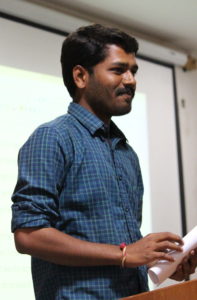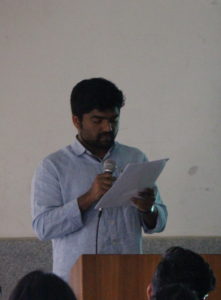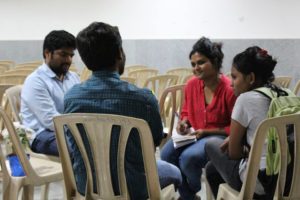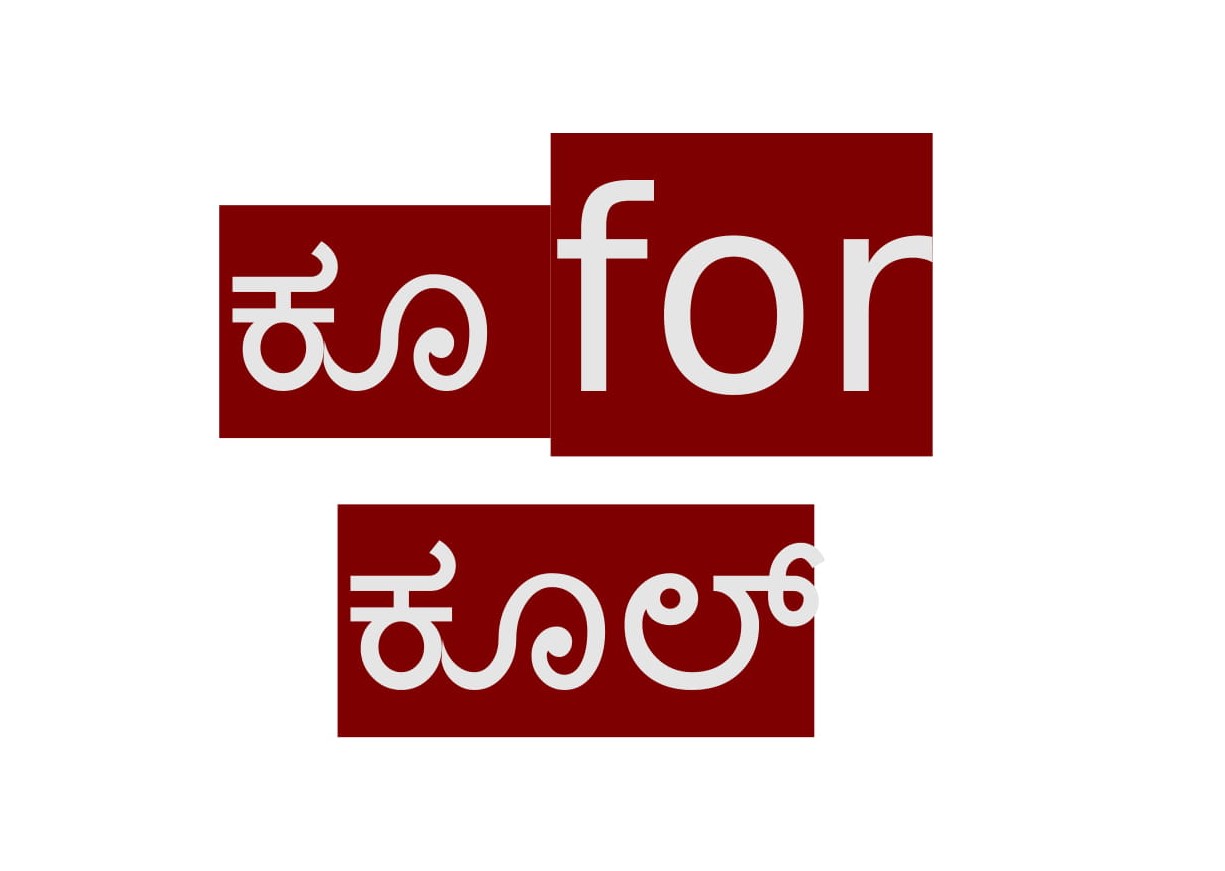Some stories can only be told in borrowed images. For this one, I must borrow Kiruba’s.
I smiled like a dog when I heard Manju Nayak Chellur read out the first line of his story.
ಅಪ್ಪನ ತಂಗಿ ಜಯತ್ತೆ ಎಂದರೆ ಜೀವ ನನಗೆ. ಅವಳ ಬಾಯಲ್ಲಿ ಕಾಮನಬಿಲ್ಲಿತ್ತು. I was very fond of my father’s sister, Jaya atte. There were rainbows inside her mouth.
As it so happens, unmarried aunts are the most fun-loving people. Of course they have rainbows in their mouths.
I remember mine fondly. Also called Jaya. She wore midi skirts and two plaits to college. On weekends when they made chicken kebabs at home, she’d steal some for us and we’d run up to the terrace and gobble them up, while the elders downstairs protested loudly.
Phoo is the story of one such aunt who would face the sun and spit out water from her mouth. The child narrator is fascinated but is never able to produce rainbows. Even so, Jayatte is an unmarried burden at home and is always reminded of this by her sister-in-law. Insults and slaps later, she does something unusual one day.
***
I know the woman in Praveen Kumar’s story ನೆನಿಸ್ಗೆಂಡು ನೆನಿಸ್ಗೆಂಡು. She is my mother’s sister who sent her husband flying out of the room with an almighty kick on his bum. Why? Because he was useless. She is also my mother’s other sister who beat her chest animatedly when I almost missed a step down the stairs but after hearing the noise she made, I lost my balance and fell down.
In the story, Renuka weeps when she sees the postman coming to deliver telegrams. She pinches her snoring husband when she’s worried about a dying mother and blushes with furious terror when he makes romantic jokes about her appa-amma.
She also inspires existential crisis in said Postman who begins to curse his job, saying thoo, after he sees her weeping at the sight of a telegram.
ತಾನು ತರುವ ಟೆಲೆಗ್ರಾಮುಗಳಿಂದ ಜನ ಪಡುವ ದುಃಖವನ್ನು ನೋಡಿ ನೋಡಿ ರೋಸಿ ಹೋಗಿದ್ದ ರಂಗಣ್ಣ. ಥೂ ಎನ್ನುತ್ತಾ ತನ್ನ ಕೆಲಸವನ್ನು ತಾನೇ ಬೈದುಕೊಳ್ಳುತ್ತಾ ಹೊರಟ.
***
In both these stories, the women are like water. They are calm and violent in ways that are unpredictable and fun to watch. They come out alive from aunt-hoods and wife-hoods so ferociously, you’ll want to step back, close your eyes and listen to their stories.
It’s how I listen to both these writers when they begin reading.

Manjunayak Chellur reading his story – ಫೂ

Praveen Kumar reading his story – ನೆನಿಸ್ಗೆಂಡು ನೆನಿಸ್ಗೆಂಡು
***
Both Manju Nayak and Praveen Kumar smile when I ask them if the city cares about its young Kannada writers. How often do they get to read out their stories in public like this?
Not at all. The last time was at the Toto Awards for both of them.
How has life been after winning Toto for Chellur? ‘I seem to have more friends on Facebook now, that’s the only change’ he says looking slight amused. He began writing because he was afraid of forgetting. He worries that if he stops writing, his memories will lose language. And what good is memory without language?
Manju Nayak works as a journalist at Vishwavani. The most frustrating thing about the job is its demands on writing to be a certain way. So what does he do?
He says that no matter how the week has been, he keeps his Saturdays free for himself to write whatever and however he wants. ‘That kind of space and time is very important for a writer, otherwise you’ll go mad.’
We both wonder what it’s like for Praveen Kumar who manages two kinds of writing. Does the energy to make films come from the same place as writing? No, he says. In fact I write to keep one language alive – it’s the Bellary-Davanagere Kannada that people find difficult to follow. But writing seems natural when I write only in that language. I feel it’s more authentic to call mothers in my stories ಅವ್ವ ಯವ್ವ (Avva/yavva) and not anything else.
How do they think people’s resistance to learning Kannada can be won over?
In Shakespeare’s The Tempest, Caliban says – “You taught me language, and my profit on’t Is, I know how to curse.”
Praveen Kumar takes this further and says, “Abuse them in Kannada, then they’ll want to learn the language to find out what you said’, he says with a poker face while Manju Nayak and I break into giggles. When I look back, I think of the phrase ulta-calibaning and feel victorious.
I complain to him about the growing disinterest that students have towards reading and writing in Kannada.
But Praveen Kumar cannot be bothered about them. He says that when you find a book that teaches you something about your own self or your life, you begin to think like a writer.
What book did this for him? Beechi, he says without taking time to think.
I know Beechi from seeing the name very often on my father’s table. He’s the only writer who makes my father laugh like a thousand jiggling bellies.
For Manju Nayak, there are many writers but Jayanth Kaikini comes to mind.

In conversation with Manjunayak Chellur, Praveen Kumar, and Kiruba at Meta 2018.
It was last week that I spoke to the two writers. I have been writing every day since then. Perhaps because when I’d asked Praveen Kumar what he does to sustain writing, he’d said ‘Bitkodbardu’
Don’t surrender it. It’s the word my colleague uses to describe riding in Bangalore Traffic and this makes more sense to me than anything has in a long time. Write like people ride in the Bangalore Traffic. Bitkodbardu.
Latest posts by Vijeta Kumar (see all)
- A review of Mother steals a bicycle and other stories - 17th November 2018
- What happened when Bengaluru’s working class women had a #MeToo meeting? - 7th November 2018
- In which I learn how to deal with peeps too cool for Kannada - 20th February 2018





